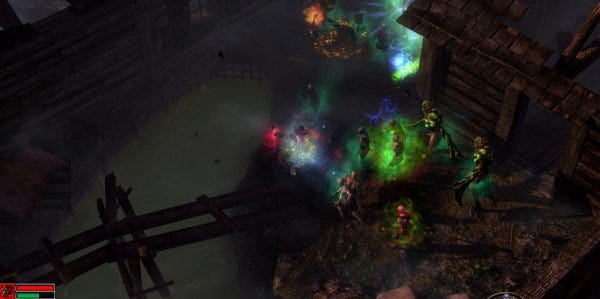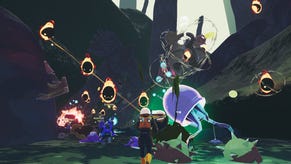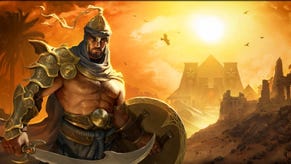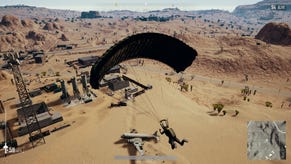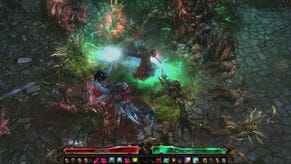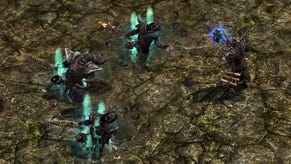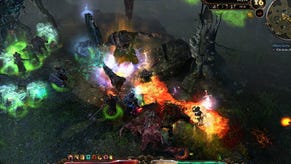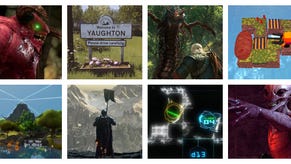Crate Expectations: On Grim Dawn's $500k Kickstarter
Interrogating Crate's Arthur Bruno
Having read our previous interview with Crate's Arthur Bruno - a crucial portion of which he has reposted on the Grim Dawn site as a sort of manifesto - I wanted to catch up with him and to talk about how the indie ARPG was looking after its half million dollar Kickstarter success. Read on for a discussion of the challenges of Kickstarting, and some good old-fashioned PC fundamentalism.
RPS: Let's kick off by talking about how you guys came to be decide you needed to go to Kickstarter. It's like a kind of super-pre-order, isn't it? It allows people to pay much more than just the price of the game, and to support the game with their wallets, which seems like it is building on the "pre-order to support us" model we had seen from indies previously?
Bruno: The decision was driven by what came before us. Very early on we had a core group of people who were working on the game, but for financial reasons many of them had to take well paid jobs and therefore couldn't work on Grim Dawn full time. It was always a very turbulent development environment. You struggled to schedule anything, you didn't know who was going to be available to be on the project... And we'd been getting a lot of fan-pressure to launch a Kickstarter. The feeling was that, well, looking at the projects that had come before Double Fine, that maybe if we did a really good Kickstarter we could maybe raise $100,000. Which would certainly would have been helpful, but it wouldn't have been enough for us to say "okay, we can take this money and finish the project."
Not being able to promise to deliver anything at that sort of level, we held off. But we were still thinking about it, and still formulating how we would do it, if we went ahead. The game changer was when Double Fine launched their Kickstarter, and proved that you can get quite far beyond $100k, which had been representative of the most successful projects up to that point. We looked at that and said "well, we're not Double Fine, we're not going to make millions of dollars, but maybe we can make hundreds of thousands". We looked at their model, because they had put a lot of thinking into it. As we were getting deeper into doing a Kickstarter, Wasteland followed, and Shadowrun, and Banner Saga. They had all repeated that Double Fine formula.
So we were inspired by that, but also locked into it, because it created an expectation among fans of "oh, here's what you get from a Kickstarter. " That was a little bit challenging, because Double Fine are a much larger studio and have a lot of connections that we don't necessarily have. They offered a wide range of rewards, and they offered some of them quite cheaply. We looked at the numbers and tried to figure out what we can offer at what level. We weren't expecting to do the bulk of sales that Double Fine did, and oftentimes the cost for producing t-shirts or prints or whatever ends up being related to the volume. The lower the volume, the more expensive the individual items. We also looked at the results from other Kickstarters, with people reporting that they ended up with much less money than they thought they were going to have, due to reward fulfilment, taxes and this and that. We tried to keep the physical stuff out of the bottom tiers, and be a little frugal in what we offered because we wanted to be making a game, not making a lot of merchandise. But there was a strong expectation by backers that they were going to be able to get a lot of that stuff.
Going all the way back to where we had set up our pre-order, we had followed the Natural Selection guys, both of whom are good friends. One of them was the lead engine programmer at Iron Lore. They told us what their pre-orders were, and said that a lot of people ordered the expensive edition. We thought we'd have a more expensive model for the alpha access, a $48 "Legendary" version, and the thinking was that we didn't want too many people on the alpha, so we'd make that the high price point for access. But as it turns out around 80% of our sales for pre-order were the Legendary version. It was really kind of shocking how supportive people were of what we were doing. Looking at other Kickstarter projects, we could nevertheless see that the bulk of the funding was from the lower tiers, because even though there are those people who will pay a lot supporting a project they really believe in, most people don't want to spend any money on a game that isn't out yet. Then there's a smaller subset who will chip in something, but generally only the base cost. So we tried to make a lot of options at the lower end, but even then it got into $100, $150 once you got the boxed version and so on.
But still, it's very surprising and humbling to see how much people pledged.

RPS: What does that money mean, exactly? Was it vital to finish it?
Bruno: We had kind of a strong start on Grim Dawn with the sheer number of ex-Iron Lore people who were helping out, but we're such a small team. Even though we had the advantage of starting with a complete source code, an action RPG still requires a significant amount of content. As time went on people went to new jobs, advanced to positions where they had no spare time, or had children- [train of thought is interrupted by some kind of machinery outside Bruno's office]
RPS: Just to return to that point, how many people are you?
Bruno: Well it was just two people, myself and a programmer at the time of the Kickstarter. Others worked part time- contributing artists, animator, sound and music guys - these were people who had by and large become busier, mostly ex-Iron Lore people, and essentially we got to the point where because of all the added life distractions, productivity was slowing down a bit. And at the same time we had a lot of people who had pre-ordered early on, and we were feeling pressure to speed things up. The Kickstarter came at just the right time for that, because it allowed us to pick up the pace, to hire, and to have a more reliable workforce to schedule the remainder of the development with. That meant that we could estimate a completion date. We now have a six person team, and some money left over to pay for outsourcing.
RPS: How did you decide on the stretch goals?
Bruno: A lot of them are, I guess, the crossover point of things which were appealing to fans, but were also low-hanging fruit. They were things that were easy to achieve without extending the duration of the project, once we had brought more people aboard. Having been in development for a while I am aware that as much as people wanted to see new features and content added, there's a equal or greater desire to play the game as soon as possible. So the decisions about these stretch goals were made in mind of when we thought was the earliest we could potentially get the project out.

RPS: How much has that stuff also come from player feedback? I mean I have read a lot of feedback from your fans and it seems that they are very keen to see their ideas incorporated, even more than game fans usually are...
Bruno: Quite a bit of it came from them. It wasn't necessarily direct suggestions regarding the Kickstarter, but things that were at the back of my mind, things that people had posted on the forums over the years. Having been such an open community over the years, I had a sense of what people want.
RPS: You've mentioned a few times that having the Titan Quest engine available made Grim Dawn possible, but how does that work? Is it abandonware? Is it licensed? Do you own the rights to it?
Bruno: Essentially we have a deal with the owners of Iron Lore whereby we own our own version of the engine, and have all of the rights to it except for the ability to sub-licence it to others. It's a very nice deal, because after a very modest back-end payment on Grim Dawn we then have the rights to continue using the engine indefinitely in our future projects.
RPS: Does that mean you can open the game to mod support?
Bruno: Well we could do that anyway, and we plan on releasing modding tools. We can't actually release the source code. That's the one restriction of our usage of the engine.
RPS: Do you feel that technology ends up getting wasted in the games industry? If you had not come along then all that stuff Iron Lore made for Titan Quest would just be junk... And don't you think indies need access to as much of that tech as possible?
Bruno: You know, it's funny that I am back to developing with a proprietary engine, because in general my feeling is that it has the potential to be wasteful, and, well, it does depends on what you are working on. If you are working on something that has unique features that don't fit into the capabilities of a commercial engine then I think it can make a lot of sense to build your own technology. On the other hand, for a small studio it can be quite an investment. I think this could be said to be one of the contributing factors for what went wrong at Iron Lore: you have to hire on a large programming team to build the engine in the first place. We were lucky that we had such a lead up time to our first contract, because for a while we were working with a group of people on that engine, so we were essentially ready to hit the ground running once we signed the contract. But once you're into development you are oftentimes just trying to meet the needs of whatever particular project you are on, and when you get to the end of that project you wind up with an engine that contains a lot of "special case" programming, and we found ourselves in that position at Iron Lore.
THQ decided that they weren't interested in another PC-only game, and they wanted to see a multi-platform RPG. In 2007 everything had to be multi-platform. We had a PC only engine, and one that was designed for an isometric action-RPG. There was an enormous amount of technical work that needed to be done for us to pitch the next game. It left us with not much time to sign our next deal. Had we signed, we would have had a lot of engine and tools work to do before we could work on the game. You end up with a period where you are waiting for tools, and if you have a pre-existing development team, and you don't want to lay people off, you end up with people who are not being utilised because their tools haven't been rolled out. By contrast when you licence a commercial engine that's already a team that is always working on the engine. There can be steep licensing fees, of course, and also other considerations. So I guess there's not a clear answer to whether you should go for a proprietary technology, but that there is waste is undeniable. Iron Lore spent millions of dollars making a tool set that could have ended its lifetime when Iron Lore closed.
To get to the other part of your question, I would say that it is vital that indie teams have access to engine technology, whether that be the more commercial engines, or open-source engine, or whatnot. There's no way we could have made Grim Dawn if we hadn't found a way to access that pre-existing engine. The development costs would have been too great for such a small team.

RPS: Do you feel vindicated in your commitment to this project by having raised half a million dollars from Kickstarter?
Bruno: Ha, I wouldn't say vindicated. It's definitely a confidence booster. Until we actually get the game out and see what the end sales will be, we don't know. The goal is to set up a small studio and keep producing games into the future. Grim Dawn is the stepping-stone to establishing ourselves. We're in indie garage mode right now. But it's feels good, and says that we're heading in the right direction. There's a lot of work ahead of us.
RPS: So what's the roadmap for that work?
Bruno: Development-wise we're in a very good position. We've had a lot of time to lay out the whole foundation of the game, to get the fundamentals, to get a bunch of art sets completed. In one sense the game is very far along, in the sense that is an elaborate and refined vertical slice, but there's a lot of content to build, and that's where the new guys come in. And as unfortunate as events surrounding the close of 38 Studios were, it has meant we've been able to hire some very talented people very quickly. The guys we've hired have hit the ground running, and learned the tools very quickly. Some of them were fans of Titan Quest and had used the tools before. They're already producing nice stuff. So from here it's a case of building the world and getting the quests implemented. Our hope is that late this year or early next year we'll roll out the alpha which will have a couple of hours of game to play and test. Because we're not working with a publisher we can be flexible about how we roll things out. I guess that's a Minecraft kind of release, where we get the alpha into people's hands and they can give us feedback. Then the beta, and eventually I guess we'll get to that final release. We'll continue building and developing even after that, however.

RPS: That's good to hear. I know there are certainly quite a few people over at RPS - both readers and writers - who are keen to see how you get on.
Bruno: I don't know if you saw the stats that Kickstarter provided, but we did get a lot of backing from the Rock, Paper, Shotgun audience.
RPS: Oh yes, I did see that.
Bruno: Yes, Rock, Paper, Shotgun was near the top of the list.
RPS: We've done a lot of coverage of the Kickstarter projects, but I think that's fair, given our interests. It's sort of idealistic, which chimes in with us being the guys who set up a PC-only site at a point at which people were claiming the format was dead.
Bruno: It's really amazing how much of a turn around there has been. People have said it repeatedly, but at the end of 2007 and 2008, at Iron Lore, a lot of us felt defeated. As a hardcore PC player I felt depressed. I felt like we were coming to the end of an era, and as a designer I was going to have re-orient myself to work on console projects. So it's been awesome to see digital distribution to cause a resurgence in PC gaming. Instead of making a niche product for a dwindling platform, I am back pioneering the next big phase of PC development!
RPS: Yes, it's important not to lose sight of how and why these phases and transitions occur. There was obviously going to be a new wave of stuff on PC because that's what happens on an relatively open, evolving platform - people mess around with it, and you get new things. The consoles stay relatively static. I think that's what exciting about digital distribution, Kickstarter and other things, because they are taking old ideas and rejuvenating them, or remixing things with new ideas. We were beginning to detect that when we started in 2007, and it felt like a new frontier opening up.
Bruno: Back around 2005 or 2006 people started really grumbling about the death of PC, and I was going out on publisher trips and they didn't want to hear about PC because their sales down so low at that point. I was always convinced that the "death of PC" stuff wasn't true, because if you look at the base technology, well, you need them around. Consoles might be well integrated into the home, but they are not a necessary technology, which PCs are. We need them for communication and productivity. The problem was in terms of distribution and hardware compatibility, and we are now starting to get past that, and converging with tablet and mobile, and that means the PC is sort of a natural platform for people to gravitate towards.
RPS: The communication and productivity point is an interesting one. When I am gaming I want to be able to alt-tab out and spam my IM with a screengrab I just took, and consoles haven't quite made that doable, yet.
Bruno: Right, and also from a development standpoint there's this sort of sense that the PC is more of an opportunity, there's a Wild West feeling to it, where things are not controlled, and you don't have a first-party company that is forcing you to conform to a certain way of doing things.

RPS: Yes. And - precisely because of that control - console development does currently seem to be dogged by a certain cynical pragmatism, whereas you get to be a bit more idealistic on PC, and the Kickstarter trend seems to be representative of that. That said, people are already talking about the Kickstarter bubble bursting, the ramifications of the first big game that goes wrong...
Bruno: I don't think it'll go away. It's too early to tell right now, but there's possibly a sort of downward as people's wallets get burned out. But I think it will continue to be a valuable means for smaller teams to get funding. When you see some big projects go bust, people will just become more savvy about what they are backing. People will need to show a bit of gameplay before they can get access to significant funding.
RPS: Agreed. Thanks for your time.
